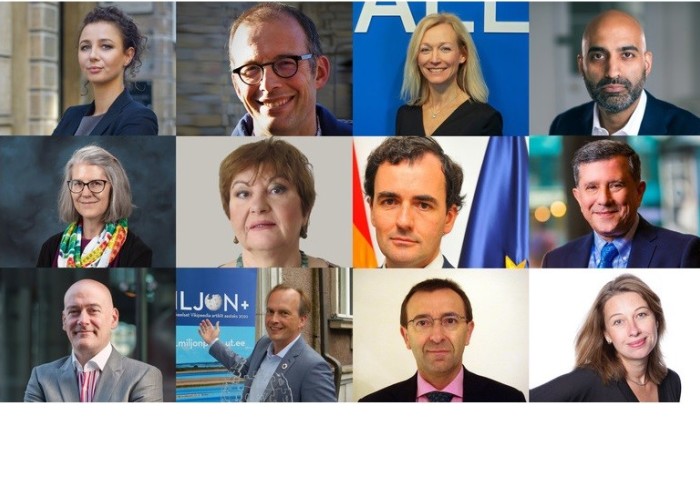NATO should be a global driver of a values-based innovation agenda

The NATO Group chaired by Professor Deeph Chana, ISST Co-Director.
ISST Co-Director, Deeph Chana, chairs the influential NATO Group on Emerging and Disruptive Technologies (EDTs).
The Group – comprising 12 experts from across academia and industry -- was formed in July 2020 by NATO Secretary General Jens Stoltenberg, to provide Allies and NATO with recommendations on how to take action in the adoption of new technologies.
In its first annual report published this week, the Group puts forward recommendations to help the alliance keep pace with new technologies and provide the right conditions for innovation.
Fundamental to the thinking behind the report is the understanding that innovation in disruptive and emerging technologies must be led by a values-based agenda:
“As an organisation focused on global security and stability, NATO should aim at ensuring that the development and the use of emerging and disruptive technologies sustains peace and prosperity, in full alignment with the Universal Declaration of Human Rights and the UN’s Sustainable Development Goals.”
The report in particular highlights space as an emerging domain which provides an opportunity for values-based exploitation to deliver global good, as outlined for example in the UN Sustainable Development Goals and NATO 2030, as opposed to continuing business as usual “perpetuating archaic conflict narratives.”
NATO must serve as a thought leader in this domain to demonstrate what a values-led approach means.
Key technology domains
The report identifies five key science and technology domains of direct interest to the Alliance: Advances in Machine Learning and Artificial intelligence; Harnessing the quantum scale; Data security; Computing enabled hardware; Biological and synthetic materials.
Importantly, the Group delivered its outputs by considering the societal contexts within which EDTs exist and how this impacts how NATO should approach the challenge.
Adding further context to the report, Deeph Chana said "Our values and goals as a society provide the motivation and direction for scientific curiosity and shape how emerging and disruptive technologies will be implemented. The values and goals we choose, therefore, will dictate which technologies emerge and whether they will prove to be positive or negative disruptions to the world's biggest challenges. The sensible direction of travel must be to direct EDTs towards minimising the impacts of conflict in the short term and eliminating the motivations for conflict in the longer term. Neither of these aims are achievable without geopolitical consensus and action."
The Group foresees the continued proliferation of cyber-physical systems; where computing systems directly affect change in the physical world and evolve autonomously through sensing and data. What's more, the Group also highlighted human-machine teaming becoming more advanced and widespread as autonomy improves. Issues around data security, privacy and personal data will continue to grow against this backdrop.
Strategic resources
Data is also highlighted in the context of it being considered a resource over which access levels could lead to friction or conflict, similar to more classic resources such as water and energy.
“Geographic data pooling has the potential to create data poverty in the world, data gathering without rights and consent has the potential to create optimal conditions for data exploitation and the insights gained from data analysis risk increasing disadvantage when it comes to accessing more conventional resources. These conditions are likely to precipitate digital and physical conflicts over data and data systems in the future – cyber-physical conflict.”
STEM-B (Science, Technology, Engineering, Mathematics, Business) talent is also highlighted as a crucial human resource of strategic importance, which the Allies must focus on both developing at home and attracting from abroad.
How can NATO respond?
The Group identifies the need for NATO to become a more agile organisation with the ability to react to the rapid pace of development in the emerging and disruptive technology landscape.
The authors propose a coherent Innovation Programme within NATO, which includes four strands:
- Widening technology literacy throughout NATO.
- Establishing an efficient network of Innovation Centres.
- Design, facilitation and participation in flexible financing mechanisms to facilitate innovation adoption from disruptive SMEs, alongside more traditional providers.
- Development of an Allied Innovation Ecosystem in cooperation with stakeholders from industry and academia.
“Organisations such as NATO face the challenge of developing and maintaining appropriate levels of STEM-B literacy needed to keep pace in a world that is increasingly driven by technology and technology related issues. This means drawing together existing experts within the organisation, becoming an active participant in research and development and providing an attractive target for future talent. Promoting multifaceted education and development initiatives which draw together technology, business and governmental elements will establish the cross-cutting talent pools of the future." Said Deeph Chana.
The full report Nato Advisory Group On Emerging And Disruptive Technologies Annual Report 2020 is available here (PDF).
Article text (excluding photos or graphics) © Imperial College London.
Photos and graphics subject to third party copyright used with permission or © Imperial College London.
Reporter
Max Swinscow-Hall
Institute for Security Science & Technology